
In a letter to House leadership, a group of House Democrats urged leadership to block Federal spending on facial recognition technologies for law enforcement.
The July 17 letter, signed by 30 House Democrats, asked that “the FY2021 appropriations bills include a prohibition on expending any Federal funds, including grants to states and localities, to purchase or use facial recognition software or contract for any similar services.” The letter specifically focused on how facial recognition technologies impact communities of color and “other overpoliced communities.”
“As the House prepares to take up the FY2021 appropriations bills, we write you on a matter of national significance,” the legislators wrote. “One of the factors that has begun to receive attention is law enforcement’s use of facial recognition software. Though this technology is becoming more prevalent in society, it remains severely error-prone and particularly so when used to analyze people of color.”
Reps. Bobby Rush, D-Ill., and Rashida Tlaib, D-Mich., led a group of legislators that included Reps. Anna Eshoo, D-Calif., Bennie Thompson, D-Miss., Alexandria Ocasio-Cortez., D-N.Y., Joe Kennedy III, D-Mass., and Danny Davis, D-Ill., in drafting the letter.
The legislators cite multiple studies from MIT, NIST, and the ACLU, which found that while the technologies have a high accuracy rate in identifying white people, it has a significantly higher error rate for people of color.
On top of concerns regarding its accuracy, the representatives discussed their broader concerns with facial recognition tech.
“Even if facial recognition technology were accurate, there are still broad concerns with its use,” the letter said. “Police surveillance cameras are disproportionately installed in communities of color, and these same communities already suffer disparities at every stage of the criminal justice system … Additionally, facial recognition provides unprecedented power for the government to track and monitor people, whether attending a protest, place of worship, hospital, or social event, raising a host of constitutional concerns.”
The legislators raised further concerns with how the use of the technology is being handled by the Department of Justice.
“The Department of Justice reportedly has access to over 640 million photos for face recognition matching and has used the technology hundreds of thousands of times,” the legislators wrote. “Despite this, based on testimony in front of the House Oversight and Reform Committee, the Department does not appear to be complying with its constitutional notice obligations; does not track basic statistics, including the number of false identifications; and does not even require probable cause or a warrant before running a facial recognition search.”
To bolster their argument, the legislators cited major technology companies that have pledged to halt the sale of facial recognition technologies to the police.
“Recognizing the fundamental dangers this technology poses, several major companies, including Google, IBM, Amazon, and Microsoft, have already indicated they will halt the sale of this technology to police,” the legislators wrote. “What is not clear, however, is how this corporate decision will apply to Federal agencies. Moreover, while these companies are well known to the general public, they are not the major players in law enforcement facial recognition.”
The representatives ended their letter by saying, “We firmly believe that the United States should not be using technology that is likely to mislabel a significant portion of its population as criminals simply because of the color of their skin, and which poses broader threats to civil liberties,” and urged that the FY2021 appropriations bills include a ban on Federal funding for facial recognition technologies.
